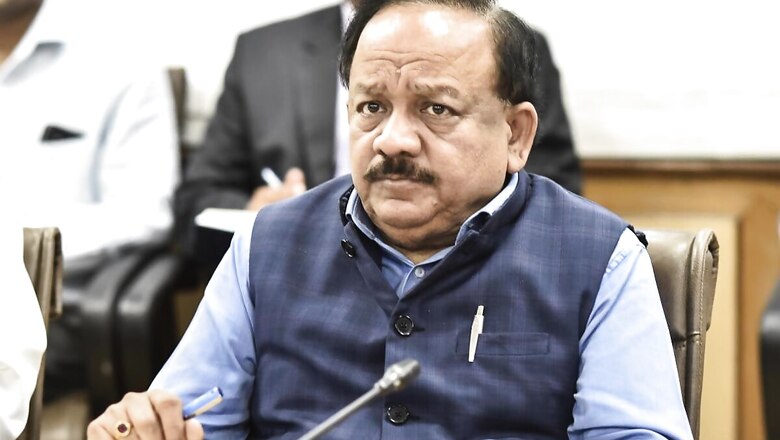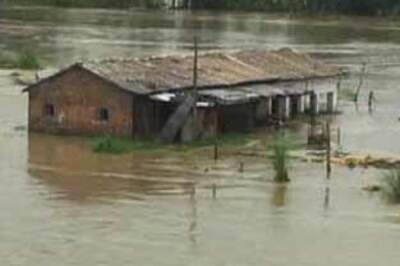
views
Union Health Minister Harsh Vardhan on Tuesday cautioned people to be more careful and take the necessary precautions against coronavirus ahead of the festive season, saying the respiratory virus could show its effect more rapidly during the winters.
He said social distancing, wearing masks and repeatedly washing hands are crucial to prevent spread of the virus. Vardhan said if the necessary precautions are taken by people, then the chain of transmission of the virus will break.
“The next 2-3 months will have festivals and coincide with the winter season. As you are aware, the…respiratory virus could show its effect more rapidly during the winter,” he said. Vardhan, who is also the Science and Technology minister in addition to being the country’s health minister, was addressing the directors of the institutes under the Department of Biotechnology (DBT).
He said if people act carelessly and forget about precautions while celebrating festivals, then COVID-related problems can aggravate. If we want to win the war against COVID-19, then precautions are very important, he said.
Vardhan also said preparations are underway to make the coronavirus vaccine available to people when it is ready. He also complimented the corona warriors for their work during the ongoing pandemic. He said at the start of the pandemic, the number of tests done in the country was small but the testing capacity has been ramped up significantly. Similarly, equipment like the PPE had to be imported, but currently the country has the capacity to manufacture 10 lakh kits every day.
Meanwhile, the Health Ministry issued guidelines for the management of co-infection of COVID-19 with other seasonal epidemic-prone diseases such as dengue, malaria, seasonal influenza (H1N1) and chikungunya. The ministry said that a high index of suspicion must be maintained for epidemic-prone diseases prevalent in a particular geographic region during monsoon and post-monsoon seasons.
Bacterial co-infections must also be suspected in moderate or severe cases of COVID-19 not responding to treatment. The ministry stressed that tests recommended by the ICMR for COVID-19 and those recommended by the programme divisions for vector-borne diseases such as malaria, dengue and chikungunya and the NCDC for seasonal influenza, leptospirosis, and scrub typhus need to be followed while ensuring the availability of rapid diagnostic kits in COVID-19 treatment facilities.
As per the World Health Organisation (WHO) case definition, a COVID-19 case may present with acute onset of fever and cough; or acute onset of any three or more of the signs or symptoms — fever, cough, general weakness/fatigue, headache, myalgia, sore throat, coryza, dyspnoea, anorexia/nausea/ vomiting, diarrhoea, altered mental status. "This case definition, although sensitive, is not very specific. Seasonal epidemic prone diseases may all present as febrile illness, with symptoms that mimic COVID-19. If there is a co-infection, then apart from the febrile illness there may be constellation of signs and symptoms that may lead to difficulty in diagnosis," the ministry said.
Diseases like dengue, malaria, seasonal influenza, leptospirosis, chikungunya, enteric fever, etc. can not only present as a diagnostic dilemma but may co-exist in COVID-19 cases. "This poses challenges in clinical and laboratory diagnosis of COVID and has a bearing on clinical management and patient outcomes," the ministry said.
While each of these infections are antigenically distinct with specific serological responses, yet in the eventuality of co-infections, cross-reactions (resulting in false-positive /false negative results) cannot be totally ruled out, especially if the testing kits used are not having requisite sensitivity and specificity," the document said. It must be borne in mind that malaria/dengue can coexist with other infections, and thus confirmation of malaria/dengue infection does not rule out the possibility of the patient not suffering from COVID-19, the ministry said.
Similarly, a high index of suspicion of malaria/dengue must be there when a fever case is diagnosed as COVID-19, particularly during the rainy and post rainy season in areas endemic for these diseases. According to the guidelines both COVID-19 and Seasonal Influenza present as Influenza Like Illness (ILI)/SARI, hence all ILI/SARI cases in areas reporting COVID-19 cases must be evaluated and tested for both COVID-19 and Seasonal Influenza, if both viruses are circulating in population under consideration.
Chikungunya presents with acute onset of moderate to high grade continuous fever and malaise followed by rash, myalgia and arthralgia. Respiratory failure may ensue in late stages. Co-infection with COVID-19 may be suspected in Chikungunya endemic areas, in the months of monsoon, the document stated. Leptospirosis apart from it presenting as febrile illness, has also the tendency to manifest as acute respiratory illness, leading to respiratory distress and shock. In areas where Leptospirosis is known to cause outbreaks during monsoon/ post monsoon, the possibility of coinfection should be considered.
Scrub typhus is known to be prevalent on the foothills of the Himalayas viz Jammu & Kashmir, Himachal Pradesh, Sikkim, Manipur, Nagaland, Meghalaya, etc. However, in recent past, scrub typhus outbreaks have also been reported from Delhi, Haryana, Rajasthan, Maharashtra, Uttarakhand, Chhattisgarh, Tamil Nadu and Kerala. The clinical picture consists of sudden high-grade fever, severe headache, apathy, myalgia and generalized lymphadenopathy. Scrub typhus infection may co-exist with COVID-19, the ministry said.
Few patients with COVID-19 experience a secondary bacterial infection. In such cases, empiric antibiotic therapy as per local antibiogram needs to be considered, it said.
Read all the Latest News and Breaking News here



















Comments
0 comment